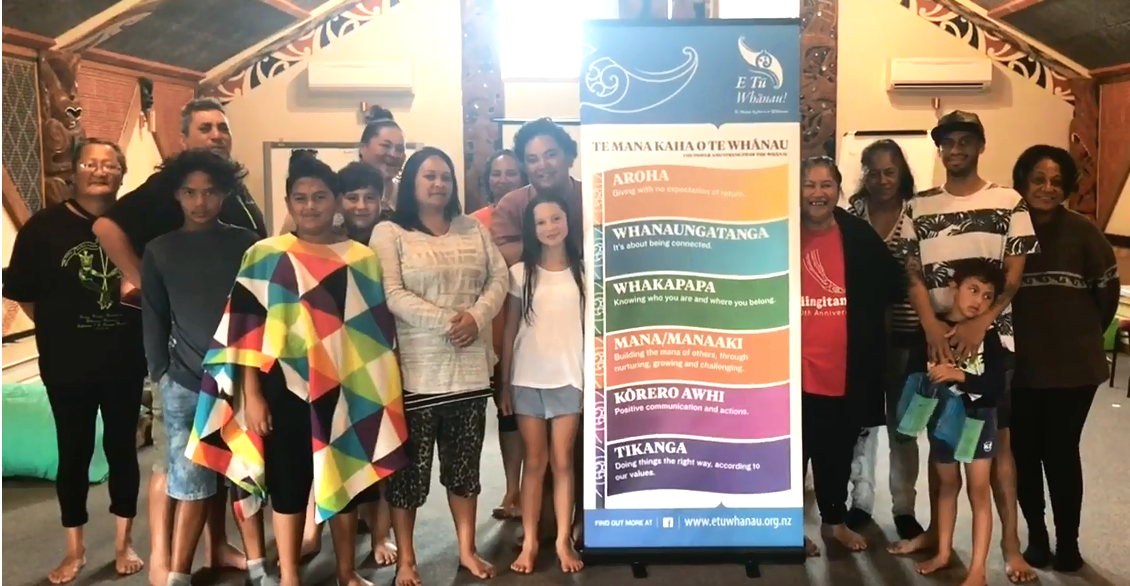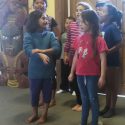In January this year, a group of Kahungungu ki Wairarapa whānau gathered in Tamatea Pokai Whenua, their wharenui on Mangakino’s Pouakani marae, to assess progress made since their first involvement with E Tū Whānau three years ago.
[movie]<iframe width=”560″ height=”315″ src=”https://www.youtube.com/embed/XGoSvJthJBk” frameborder=”0″ allow=”accelerometer; autoplay; encrypted-media; gyroscope; picture-in-picture” allowfullscreen></iframe>[/movie]
They talked of children in Oranga Tamariki care reunited with whānau. Young pakeke questioned the roots of their own violent behaviour.
They talked of rejecting dodgy lifestyles, embracing good jobs and healthy ambition. Others spoke about trusting each other to solve problems collectively, of breaking the silence that festers when people feel they must keep their struggles to themselves.
They talked with pride of their history, of the courage and resilience of their tīpuna and the profound impact colonisation has had on them as a people and as individuals. They’re on a journey and they all agreed that they’re going in the right direction.
Powerful wānanga
It was a powerful and uplifting end to a three-day hui that started with a community wide decolonisation wānanga facilitated, at their personal invitation, by Tuhoe artist and activist, Tama Iti. A handful of Pākehā with homes in the village joined them on the first day because, as one of them put it, ‘I knew that I knew so little, and how right I was!’
Day one was a textbook example of ‘cross-cultural community building’. Māori simply call it manaakitanga.
Memory Te Whaiti was one of the organisers.
“We felt it was up to us to help them understand us in a comfortable, non-threatening environment where no one thinks they’re better than anyone else.”
Memory knows a lot about the injustices faced by her tīpuna from the early 20th century, when they developed the barely fertile land given as inadequate compensation for the loss of their rohe on far away Lake Wairarapa.
“Our people came here to build a life. But the life they’d dreamed of wasn’t going to happen.”
She and her cousin Noelene Reti called everyone together for the very first hui out of frustration at the aftermath of that injustice – the unacceptably high levels of violence, substance abuse and ill health affecting some of their whānau.
Marae for community
Memory credits the decolonisation hui with helping her process the hurt and “to stop being outwardly angry all the time.”
“But I won’t let it be forgotten either. I can forgive but I’ll never forget. People need information to make decisions which is why I need to know, and remember, our history for those who’ll be here after I’m not.”
Manuhiri were blown away by the experience calling it challenging, absorbing, professionally facilitated and welcoming. One of them, local businessman Shaun Swan, knows Memory through the local school community.
“Memory told me the marae was a community place where anyone was welcome. I didn’t know that but I really feel that now.”
The second and third day of the hui were given over to the whānau themselves.
Focus on values
E Tū Whānau stalwarts, PJ Devonshire and his partner Pania Haruru have been at every hui, sharing their knowledge of Kahungungu lore and their own experiences of regaining tikanga Māori and living the E Tū Whānau values.
“E Tū Whānau is a kaupapa embedded in the Māori world view,” PJ said.
“They’re our values. Our tīpuna talked about them, our kaumātua talked about them. How can those values help us bring some peace right now? How can they help stop the violence between our communities, within our marae, our whānau, everywhere?”
They talked about family violence, how whānau must challenge perpetrators and how they need to stand by those whanaunga who are also perpetrators.
One woman talked of her hurt and confusion when facing her brother’s behaviour.
“We get so used to violence. It happens and the next time it comes around we shrug our shoulders and go, ‘oh well’.”
“But I say to my brother, ‘why can’t you stop it?’ I’m your sister and you’ve never been violent to me so why would you think it’s ok to be violent to a woman who is a partner to you?”
Stories of change
Whānau shared stories of change. Some were small, others substantial but they all stemmed from kōrero shared over recent years at these wānanga.
 Here are just a few of those stories.
Here are just a few of those stories.
Tamariki removed from their meth addicted parents by OrangaTamariki are back living with grandparents. Their aunt Hinehuirangi, a young mum herself, said the first E Tū Whānau wānanga encouraged everyone to question their acceptance of the parent’s dysfunctional behaviour. It kick-started the change that led to the return of those tamariki to whānau.
“We were all about minding our own business, accepting that their lifestyle was normal. Well it’s not and it never will be again.”
Memory’s son Te Kawekairangi said the E Tū Whānau kaupapa helped whānau communicate better with each other. He’s had his share of trouble but credits the E Tū Whānau kaupapa with helping him understand and work on his own issues.
“I’ve gathered up a lot of tools by doing this; it’s whether I want to apply them or not,” he said.
“Sometimes I don’t really care about the consequences of what I do. That’s just the way my mind thinks sometimes…but I’ve gotten better at that and at the back of my mind it’s always where I want to go and what I want to do with my life.”
Te Kawekairangi is full of enthusiasm for his job as a dairy hand on ‘Wairarapa Moana’, the incorporated farm they all whakapapa to. He’s following in the footsteps of his grandparents, great grandparents and great uncle who developed the farm and laid the groundwork for its current success. His future is full of hope.
“I want to manage one of these farms. Not ‘I want to’. I’m going to.”
Noelene talked of whanaunga who had died and their importance in the E Tū Whānau journey before acknowledging a young father who’d come along with his young son.
“Yet another whānau member from the younger generation has joined us. He was brought up in a dysfunctional environment, but he wants to be with us. He wants to make a difference for his son.”
Whakapapa
For two days whānau sang and studied waitata full of whakapapa and stories of the land their tīpuna lived in and named. Many of those tīpuna live on in the carvings in Tamatea Pokai Whenua.
On the last day, they discussed what they’d learnt, their plans for the future and using the E Tū Whānau values and resources as a framework to continue exploring the unique history of their Kahungungu ki Wairarapa iwi.
Noelene finished by telling whānau that together they had the knowledge to make the changes they wanted to see in their community.
“We’re confident that we know how to do this. We now know how to run wānanga like this for more of our people and we are making change.”

